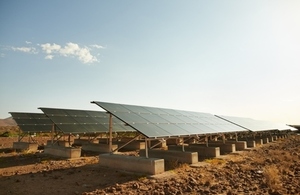Swanbarton: empowering communities in the developing world
A business supported by the Energy Catalyst programme is helping to put the power to supply electricity into the hands of developing communities.

We take power for granted in the developed world, but a billion people living on this planet have no access to electricity. A similar number have access only to unreliable and intermittent supplies.
They are mostly concentrated in sub-Saharan Africa and South Asia. The United Nations sees universal access to electricity as a key to its fight to end poverty by 2030.
However, the wires and pylons needed to construct the infrastructure are expensive and are only viable in larger communities.
Many of these rural communities are rich in the solar, biomass and wind that could make a significant contribution to local electricity supplies.
Swanbarton Energy Catalyst project
Anthony Price, managing director of energy consultant Swanbarton, said:
Just a small amount of electricity can transform lives.
It can provide the lighting at night that children need to read and study. Lighting keeps people safe at night. Electricity powers the fridges that hold vaccines and medicines to improve health. It can electrify the processes used in businesses that will bring significant economic benefit.
Connected micro-grids can electrify communities quicker
Wiltshire-based energy consultant Swanbarton is working with partners on an Energy Catalyst project that could deliver small electricity grids to communities that have little or no power.
The micro-grids are based on renewable energy, battery storage and a local energy trading platform.
The company and its partner, Edinburgh-based Scene Connect, trialled a local energy trading platform, EMBLEM, on the edge of the electricity network on the Scottish island of Iona.
Swanbarton supplied the trading platform while Scene Connect supplied the off-grid energy metering and control hardware.
The Energy Catalyst-funded project was a success, and the two have now partnered with Gham Power in Nepal, Dassy Enterprise in Rwanda and Edinburgh’s Connected Energy Technologies for a follow-on Energy Catalyst project.
It will trial an interconnected solar homes system with peer-to-peer trading in Rwanda and look at the feasibility of integrating behind-the-meter generation and storage resources in Nepal and estimate the value this would bring to the local distribution networks.
The trial system in Rwanda is based on connecting existing renewable generation and storage units to properties that are not yet electrified. Those users can also generate and store their own electricity and sell any excess through the trading platform.
It means the micro-grid can grow organically, and anyone investing in it has confidence they will receive a growing and long-term income.
Anthony added:
While infrastructure to deliver energy is high cost and capital-intensive, the energy itself is relatively low cost.
If you have a community-owned solar plant with a community-owned milling machine and people pay for their heating and lighting on a trading basis electrification is a lot quicker. This would support the Rwandan rural electrification strategy, with its target for 100% electrification by 2023/24.
New energy technologies will benefit developing world
Swanbarton was founded 16 years ago and is a leading specialist consultant on battery technologies. It also has a research team looking at new energy technologies including energy storage control devices and peer-to-peer trading in local energy markets.
Anthony added:
We are coming up against regulatory blocks in the UK for developing peer-to-peer energy trading in real time. We are not quite there yet.
The Energy Catalyst has allowed us to modify our proposal and look at how it could be applied in other countries. It allows us to carry on doing the development work, which is good for us and our partners, and come up with projects that will be of value to people in the developing world.
Updates to this page
-
First published.